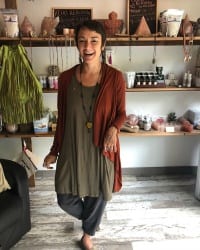
Glennon Doyle is one of the headliners you can learn from at Wellspring this October. For tickets and more information, click here.
Wellness industry professional discounts and scholarships available!
You eat food grown or raised responsibly. You’re conscious about the cleaning products you use in your home, and you’re aware of what the labels on your clothing mean. You’re so conscious, in fact, about your daily decisions, that there seem to be very few areas in your life where toxicity seeps in. But, of course, the last frontier of evolution is invariably that which is closest to home. When it comes to removing the bad stuff from our lives, we tend to look externally, rather than turning inward and address the patterns, behaviors, or relationships that can be as toxic to the soul as factory-farmed meat, parabens, or child labor are to the world as a whole.
I should know. To get real personal here: I’m in the midst of a social revolution in my own private world, spurred by the realization that the community I thought was my community isn’t as radically inclusive or radically accepting as they purport to be. I sincerely accept the personal responsibility I bear for the breach in friendship—but the cowardice and lack of empathy I’ve experienced from those I held dear for a decade points to a painful truth: They were, perhaps, toxic relationships all along. Recovering from that loss will be a long journey—and it’s a journey I must undergo alone.
What does it mean to remove toxicity from our lives? What can we do to spiritually protect ourselves from unhealthy relationships, in all sense of the word? Bestselling author, Founder/President of Together Rising, and self-proclaimed Love Warrior Glennon Doyle has some ideas.
Recognize what’s a toxic relationship.
“For me,” says Glennon, “a healthy friendship is one in which we are never earning each other’s loyalty or proving our friendship to each other.” She believes that there can be freedom in friendship—and she sticks toward relationships that give her that feeling. What defines that freedom is different for every person, but there are some basics.
“There is no striving, no guilt, no trying, even,” says Glennon. When there’s freedom in the relationship—however you define that to be—she says we are then “able to feel fiercely devoted to that friend’s heart.”
Conversely, we may hold on to relationships or friendships that no longer serve us simply because we consider them a close friend. “Several different women have come to me with this problem: ‘I have a really good friend who makes me feel like crap all the time.’ To that I say: No, you do not have a really good friend who makes you feel like crap all the time. Because a good friend does not make you feel like crap,” says Glennon.
Her strategy for toxic friendship: “Bless and Release.”
You are your own healer.
According to Glennon, toxic relationships are so difficult to let go because we get stuck in a holding pattern of waiting for the person to hurt us to absolve us of the pain they’ve caused, rather than looking within to find that absolution. Simply put: The person who hurt you isn’t going to be able to be the person that heals you.
“We are so intent on getting healed by those who hurt us that we wait in the pain,” she says. “But the thing is that we will die waiting.” Glennon says that it is our personal life’s work to heal ourselves—to release ourselves from the pain that we’ve been caused—not that of the person who hurt us.
Liken it to someone who eats fast food for every meal. There’s no doubt that the unhealthy ingredients in that supersize meal contribute to the poor health of the person, but it’s not the fault of the supersize meal. It’s the responsibility of the person who eats that every day to change her behavior. The same can be said of relationships. “It can be hard, but it is simple,” says Glennon. “If you don’t want to keep getting wet, close the window.”
Set your boundaries.
Glennon says there are four great loves in her life: Her wife, her children, her sisters, and her boundaries. “I love humanity,” she says, “but actual human beings are hard for me.” To get around this, Glennon sets boundaries in her relationships, and sticks with them. If someone is continuously driving her nuts, she gently allows that person to drift out her life. Why continue with a relationship that’s not satisfying?
“Some relationships feel too heavy because we’re meant to gently put them down and carry on,” she says. “Gentle goodbyes can be acts of great courage and kindness. Holding an unhealthy relationship close is not love or being a good friend. Keeping her close and hating her isn’t kind. Sometimes kind is a gentle goodbye, for now.”
That doesn’t have to be forever. You can release friendships when they no longer serve you—but with the compassion and empathy to allow that person back into your life if they show that they, too, have accepted the responsibility of their actions, and have done the work to make big change. Part of living mindfully is not just to recognize that which no longer serves you, but to recognize when you can be of service to others. Forgiveness is a powerful vehicle for spiritual growth.
Trust your gut.
When it comes to recognizing toxic relationships, the best tool we have is our inner voice. “I believe you can trust your gut with almost everything,” says Glennon. Women, in particular, she says, are taught to ignore than inner voice—to silence our intuition—and instead put the happiness and the needs of others above our own.
“The more our inner whispers fade from disuse,” Glennon says, “the more our bodies speak up, trying to get our attention. We get tired. We get sick. We can’t sleep. And we ignore these voices, too. If you refuse to listen to anybody long enough, she’ll stop speaking. Which is why one day we realize we have lost our way.” The antidote to this? Get quiet to hear—and to trust—your own voice. Glennon says this voice will speak to us about all parts of our lives, including friendships.
The final word on removing toxicity from your life? “Practice being, to yourself, the kind of friend you need others to be for you. Speak to yourself with kindness, courage, and respect. Offer yourself grace. Delight in you. Listen very carefully to yourself.”
You’ve had the answers all along.
—
 Lisette Cheresson is a writer, storyteller, yoga teacher, and adventuress who is an avid vagabond, homechef, dirt-collector, and dreamer. When she’s not playing with words, it’s a safe bet that she’s either hopping a plane, dancing, cooking, or hiking. She received her Level II Reiki Attunement and attended a 4-day intensive discourse with the Dalai Lama in India, and received her RYT200 in Brooklyn. She is currently the Director of Content at Wanderlust Festival. You can find her on Instagram @lisetteileen.
Lisette Cheresson is a writer, storyteller, yoga teacher, and adventuress who is an avid vagabond, homechef, dirt-collector, and dreamer. When she’s not playing with words, it’s a safe bet that she’s either hopping a plane, dancing, cooking, or hiking. She received her Level II Reiki Attunement and attended a 4-day intensive discourse with the Dalai Lama in India, and received her RYT200 in Brooklyn. She is currently the Director of Content at Wanderlust Festival. You can find her on Instagram @lisetteileen.